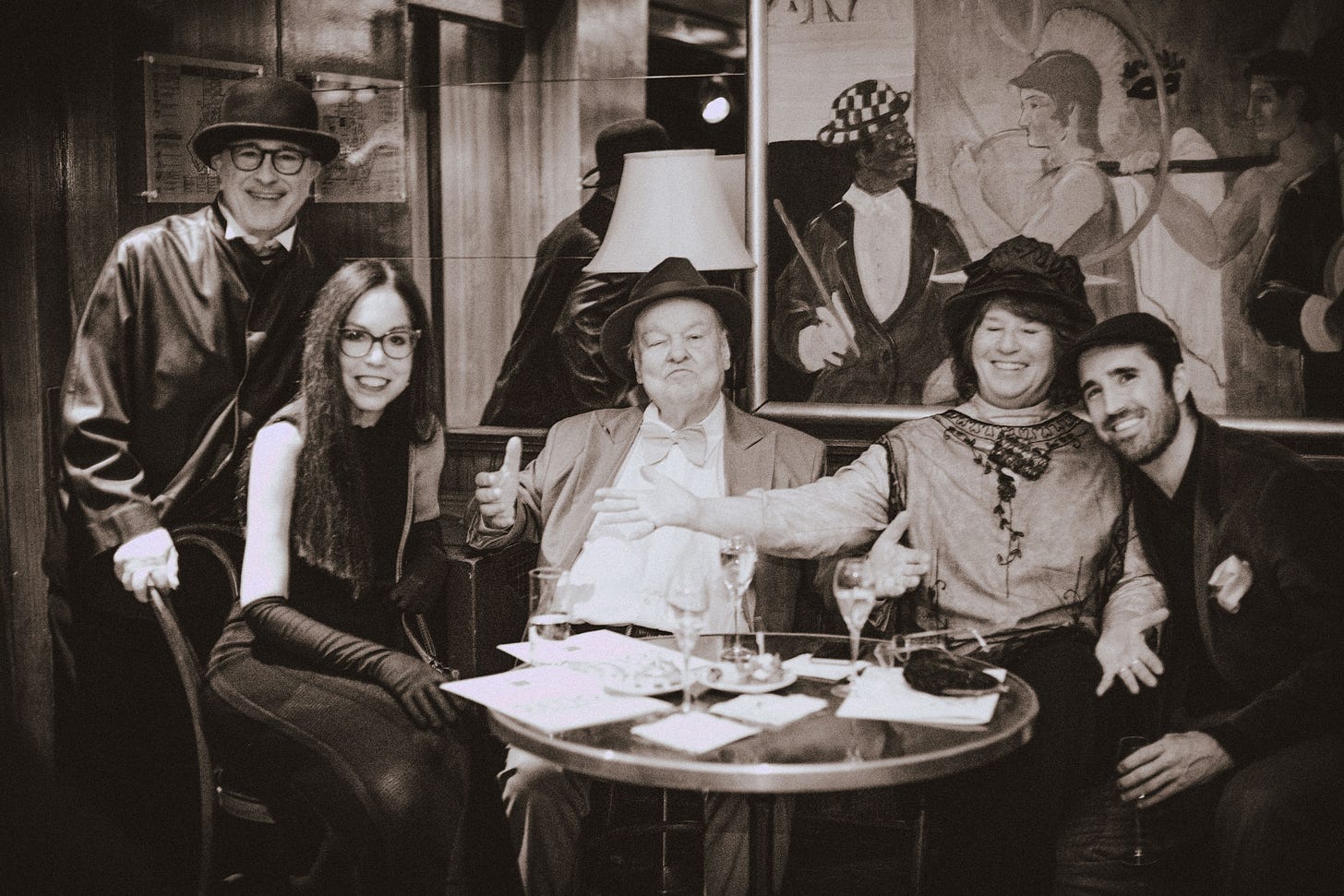
I haven’t been able to write much on the computer as of late.
Maybe it’s because I’m a procrastinator who blames the dreariest Parisian winter in recent memory for causing me to avoid my responsibilities on the blue light screen.
Or maybe it’s because I’ve been taking time off leaving the literary fields fallow since publishing my latest novel, The Requisitions, this winter, a historical metafiction set in Nazi-Occupied Poland which took me thirty-six years to understand and a decade to complete.
Or maybe it’s because these days, when it comes to writing on a computer, it’s increasingly unlikely that I’ll be able to focus on anything resembling literature, what with the crowded inbox and incessant news feeds that nibble into my soul, and Substack Notes, whose promises of deepening this community more profits don’t make me feel like a writer but a cheap car salesman, what with the torrent of clickbait articles and self-promoting witticisms (yes, we’re all guilty), not to mention the arrival of Substack influencers, who have come here not to write but to create content (if we’re going to be under the influence, can it at least be the influence of wine or drugs?)
Yes, I’ve grown suspect of my computer as of late, which is why even if my dashboard tells me I’m gaining followers by doing exactly nothing, I can no longer compute the word “follower” without also hearing the word “leader,” which necessarily begs the question: where exactly does Substack want us to lead each other, aside from an increase in paid subscriptions?
Appearing
In Guy Debord’s The Society of the Spectacle (1967), the French theorist suggests that during late-stage consumer capitalism, human beings have devolved from creatures of being (e.g., a writer) to having (e.g., book sales) to appearing (e.g., telling “stories” on Instagram about just how writerly I am).1
These days, it seems less important to write about anything real than to appear to be the kind of writer that people are reading. The proof is in the profits, and this insidious notion that contemporary artists (save Frank Ocean) need to appear to be productive (especially on social media, Substack included) has, according to authentic artists like Ryan Egan, with whom I had a very spicy Sichuan meal last week on Rue Saint Sebastien, created a low hum form of nausea that cannot be quelled if we keep thinking it’s possible, let alone desirable, to consistently write pieces truly worth reading versus simply to attract attention.
In the same way that it requires discipline to share post-worthy pieces every week (for the first year on Substack, I stuck to a weekly routine), it also requires discipline to stay away from metamodern consumptive trends.2
Having
And yet … and yet … I wouldn’t be writing any of these words if I didn’t feel Substack was still a fundamentally enriching space (this schizophrenic oscillation between critique and appreciation of consumer capitalist products seems to me to be at the heart of why we’re so confused and frustrated all the time).
Because it’s true: thanks to a growing community of readers over the past 2.5 years, I decided to forego querying dozens of literary agents to publish The Requisitions independently by creating a micro press imprint with my wife, the photographer Augusta Sagnelli
(The Requisitions has been out for a few months now. As of today, 52 / 300 limited-edition copies remain, and because I’ve been able to retain 100% of the rights, I’ve been able to financially survive a long winter).
Suppose I’d gone for a more traditional publishing route. In that case, I’d most likely still be waiting to hear from a slew of literary agents who may or may not pick my hallowed ten pages off the slush pile. Even if one decided to read the entire manuscript and then accept it, the agent would then have to pitch it to a publisher, effectively starting the entire process again (if it took JK Rowling 12 tries to find a publisher for Harry Potter, how long do you think it might take for an agent to find a publisher for a historical metafiction set during the Nazi Occupation of Poland? Woof.)
Add to these complexities the inevitable delay in going to print (the backlog of titles pushed back due to Covid = a shitshow of a situation). Even if, by some miracle, I found a way to traditionally publish The Requisitions within a year or two, I’d then have to pretend it was new and exciting many years after I’d psychologically moved on from it and lost all motivation to peddle my wares, thus forking over 85%+ of all sales to the publisher (and a further 10-15% my agent), all for the unlikely scenario that an advance would be large enough to allow me to begin work on a new novel.
No thanks.
Instead, in December, I wrote a query letter to Substack and announced that I would be self-publishing independently publishing The Requisitions. One of the many unexamined truths of publishing in the 21st century is that many large publishers outsource their work because it’s cheaper, which means the very same people to whom publishers pay barely livable wages are also artists capable of working for themselves, so long as they have clients to hire them.
Once Augusta and I realized we knew editors and illustrators and printers and experts in layout and design,3 we wondered what exactly a traditional publisher could offer us that our own connections couldn’t, and the answer became quite simple:
Independent publishing allowed us to retain principles and profits.

Being
I could show you the numbers proving how much more money I’ve made selling 248 copies of an independently published novel than I did selling 1,300 copies of my first novel via a publisher that gave me a fair deal (I bought back the rights in 2022), but that’d be gauche.
Following 3.5 months of quiet, steady book sales (52 / 300 copies remain), it is clear to me that the most fulfilling moments surrounding the publication of a novel aren’t about book sales or profits but the human connection. In March 2024, the American Library in Paris invited me and eleven other artists to their annual Roaring Twenties Party, which took place in the time-capsule dance hall beneath La Coupole, a historic bar on the Boulevard Montparnasse where the likes of Josephine Baker, Zelda Fitzgerald, and her drunken husband used to party. Over endless coupes of champagne and a live jazz band to boot, one hundred and fifty guests mingled and danced and sang while Augusta captured the magic with her unique, lovely eye. Here’s proof:
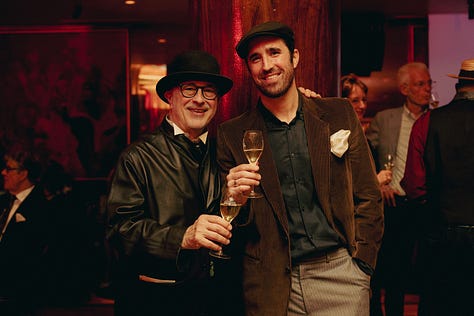

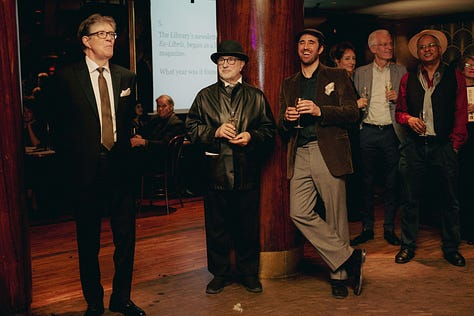

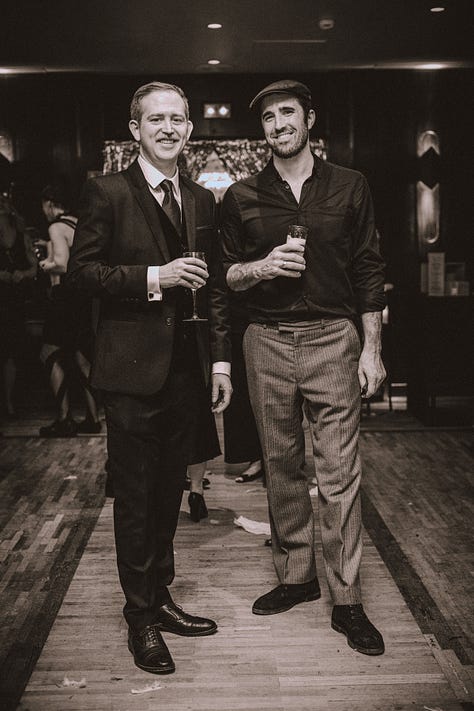
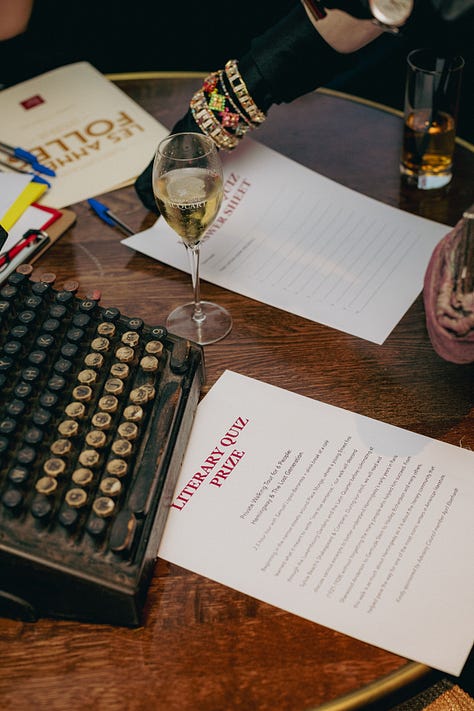
It was a killer party, and I was honored to display a stack of signed copies of The Requisitions next to other authors whose works I’ve always looked up to: Stephen Clarke and Jake Lamar and my dear friends (and mentors) Heather Hartley and John Baxter
The champagne flowed until midnight, as did the literary conversation, and what a relief it was to reminisce on the party not because of how many books we sold or who might introduce us to a literary agent but because we were all living the writing life in Paris.
During April in Paris, out beyond the confines of the digital screen, I also gave a walking tour to Evelyn Skye, a best-selling author with a Netflix series to boot. We barely spoke of the rampant materialism that has come to define literary success in the USA. Instead, we discussed life, literature, and all the rest of it along the narrow Cour de Commerce Saint Andre, a 17th-century cobblestone street where Voltaire, Rousseau, and Diderot used to philosophize at the Café Procope.
Keeping my distance from the digital responsibilities of self-promotion, a few days later, I visited Penelope at The Red Wheelbarrow, a quintessential Parisian bookstore on the edge of the Luxembourg Gardens, to see how many copies of The Requisitions remained (two by my last count).
Just last week, I had a coffee and a chat with Adam Biles of Shakespeare and Company, whose latest novel has received rave reviews, before dropping off my book at that hallowed literary space (despite its famous name, it is not the same bookstore where Hemingway and Fitzgerald and Stein and Beckett once visited. The OG Shakespeare & Co., owned by Sylvia Beach, was at 12 Rue de l’Odéon and closed in 1941; here’s a 1-minute video of me explaining the history).
In my most lucid moments, I recognize these are modest moments in the grand scheme of things, but I’m a writer, and I wanted to note them down because when I’m old and gray (a novelist can hope), I know they’ll still mean something to me.
Over the next few months, Augusta and I will be publishing a revised 1st American edition of The Requisitions via Ingram Spark, which will allow us to sell (and distribute) to bookstores and libraries across the USA, but for now, with only a few dozen copies of The Requisitions left, I feel gratitude for you, dear reader, and for the human experience—for Carole, the inspiring librarian from Berkley, California who bought my novel after we walked around Montmartre, and for Chris and Imane and Amruta, all of whom have been in this city as long as I can remember and were there last night to hear me do a reading at Culture Rapide, and the young study abroad student from Columbia who purchased a copy and asked how someone might become a writer in this day and age, and for Frank the Postman, who doesn’t charge me extra fees to send The Requisitions to various corners of the world …
Recalling these moments reminds me of the irreplaceable importance of the human experience—for novelists, Substackers, and humans everywhere—during a time when so many people across all industries insist that the most valuable aspects of an artist’s life should be lived advertised online.
Augusta and I called our imprint Kingdom Anywhere because we believe in a world in which artists can thrive by placing principles front and center—and what is a kingdom, after all, if not a worldly community?
Debord is one of the most underrated thinkers of the 20th century. If you’re interested in learning more, I wrote an essay about him, which now exists in a print-only publication called “I Need to Be Chosen by Fiction: A Critical Companion to Stokes Pricket,” an anthology compiled by the mysterious author known as “Stokes Pricket.”
Here’s a curiosity: historically, the word consumption referred to a wasting disease (like tuberculosis). Huh.
Shout out to Yann Rousselot Mila Phelps Friedl Carrie Chappell for killer editorial skills





I'm inspired, thank you, Samuel. You may just have tipped the scales for me to the self-publishing side. I'm also happy to hear you feel Substack is "still a fundamentally enriching space."
proud to be a part of the process. xx